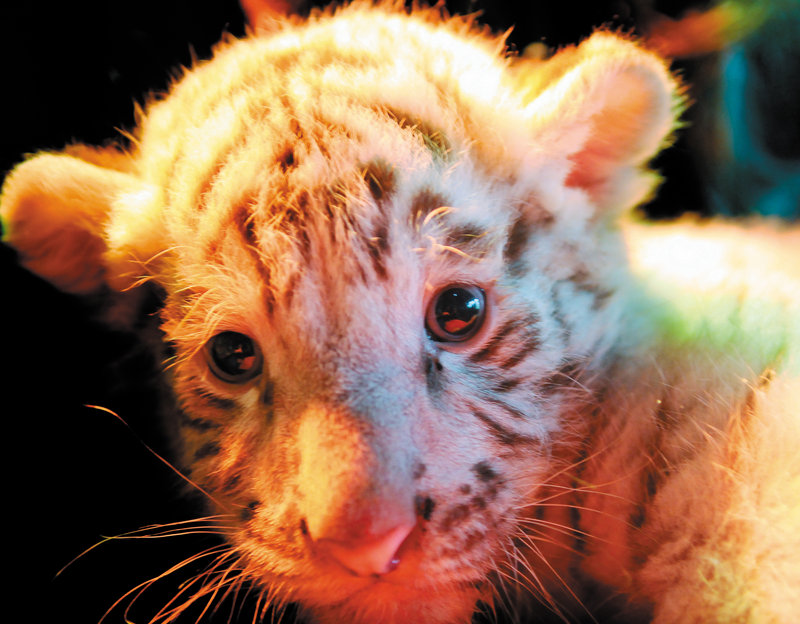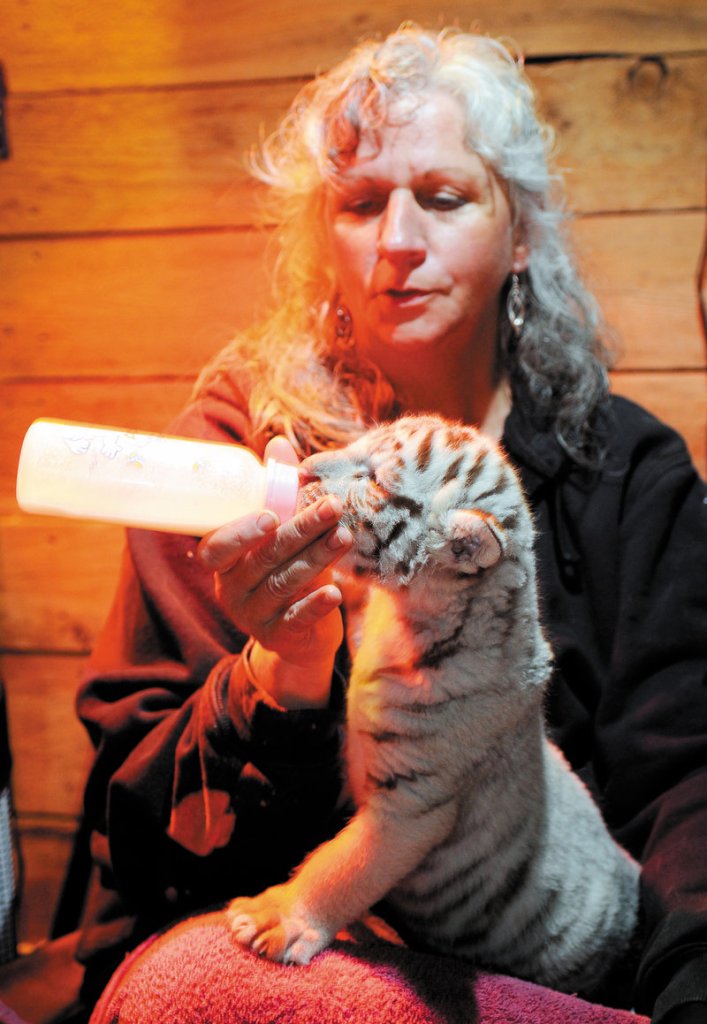MOUNT VERNON – A baby white Bengal tiger is the latest exotic addition to the DEW Animal Kingdom and Sanctuary.
Makeena, who makes her home at the unconventional refuge tucked away on 42 acres, is just five weeks old. Weighing nine pounds, she appears to be more gentle pet than eventual beast.
And while she requires feeding from a bottle every four hours, some day soon she will graduate to ground meat. And, in about four years, the tiger could weigh as much as 500 pounds.
She arrived at the facility May 5, and is taking up a lot of time for Bob and Julie Miner, the husband-and-wife team who own the sanctuary.
“The lack of sleep is very challenging, but it’s short term,” Julie Miner said.
Makeena was donated by a facility in the southern U.S. the Miners declined to identify.
“When the guy goes, ‘How about a white tiger?’ My wife said, ‘What?’” Bob Miner said.
“I just didn’t think it was possible,” Julie Miner interjected.
The Miners said the facility gave them the tiger out of respect for their educational programs.
Julie Miner said tours at DEW are “fun, educational and interactive.” They don’t just show people what is in the park, but also describe how the animals got there, and how they are taken care of.
Often, schools will take students there for tours. Bob Miner said approximately 3,000 people visit the park in a typical summer.
Bob Miner said the general public lacks knowledge about exotic animals.
“They think they want (tigers) as a pet,” he said. “This is not a pet.”
Makeena is one of five tigers in the park, which also boasts five lions as well as leopards, lynx, lemurs and a host of other exotic Maine and barnyard creatures.
Julie Miner said Annabesscook Veterinary Clinic in Monmouth takes care of their animals — including the exotic ones.
“It’s a privilege for the public to be able to come and see one here, in as natural a habitat as we can create for them here,” she said.
A recent interview in a small wooden building in the park was interrupted multiple times by the roar of a lion, a kookaburra’s call and a chorus of wolves.
“That’s not a howl,” Bob Miner said of the wolves. “That’s the Lord’s symphony. That’s a song.”
Maine creatures are kept in their own section of the park and are always returned to the wild, barring any disability, Julie Miner said, while exotic creatures are kept year-round in the park in enclosures built to ensure they don’t escape.
“We’ll take anything but dogs, cats and Homo sapiens,” Bob Miner said.
The Miners hope to eventually breed Makeena with a 5-year-old tiger they have already.
Tigers live 10 to 15 years in the wild but can live more than 20 in captivity, according to the website of the Defenders of Wildlife, a national nonprofit organization.
DEW Animal Kingdom and Sanctuary — DEW stands for “domestic, exotic and wild” — began in 1980 as “animal therapy” for Bob Miner, a disabled veteran.
He’d had three strokes and a heart attack, he said, and “hated people.”
“I was totally reclused. I didn’t want people around me,” Bob Miner said. “So I collected animals.”
“He could tell people about the animals,” Julie Miner said.
Bob Miner said he still has trouble communicating with people outside the presence of his animals.
“If I can talk about my animals — my kids — that’s the big thing,” he said.
Every New England state except Maine and Rhode Island bans possession of exotic animals. Nine states have no permitting requirements for them.
Maine is one of 12 states that requires a state permit for ownership of exotic animals, usually defined as nondomesticated felines, wolves, bears, reptiles and nonhuman primates.
In Maine, the agency is the Department of Inland Fisheries and Wildlife, which issues three classifications of permits: one for exhibitors, another for wildlife propagators and another for general possession.
The two-year exhibitor permit DEW has costs $147 and includes the privilege to show and breed.
The Miners said they also have an exhibitor’s permit through the U.S. Department of Agriculture.
News of Makeena’s arrival, originally reported by WCSH-6 in Portland, was picked up via the Associated Press by news outlets nationwide.
The Miners said the last time they got this much attention was about 15 years ago when they got a black panther.
Julie Kilgore, a livestock specialist with the Maine Department of Agriculture, said she has been to DEW multiple times. She called the animals “well cared-for.”
“The owners are very informative,” Kilgore said. “I would (recommend) them as a source for people looking to own any types of animals.”
Donald Hoenig, Maine’s state veterinarian, said he has not been to the facility, but has heard nothing but positive reports.
“I certainly think they run a good establishment,” he said. “I haven’t had any issues with them, for sure.”
Jessie Geis, the animal care manager at Franklin County Animal Shelter in Farmington, said she has volunteered at DEW in the past, helping build enclosures.
“Bob might be a little rough around the edges, but he knows his stuff,” she said.
The Miners said they understand why there is a national buzz about Makeena, but they do not treat any of their animals with more or less care than necessary.
“It’s as fun to see the lamb kicking up rocks as it is to see the tiger jump in the water,” Julie Miner said. “Some people don’t believe it. It’s true.”
“I don’t care whether it’s a lamb or what it is,” Bob Miner said. “They’re all living things. They all mean so much.”
Send questions/comments to the editors.




Success. Please wait for the page to reload. If the page does not reload within 5 seconds, please refresh the page.
Enter your email and password to access comments.
Hi, to comment on stories you must . This profile is in addition to your subscription and website login.
Already have a commenting profile? .
Invalid username/password.
Please check your email to confirm and complete your registration.
Only subscribers are eligible to post comments. Please subscribe or login first for digital access. Here’s why.
Use the form below to reset your password. When you've submitted your account email, we will send an email with a reset code.